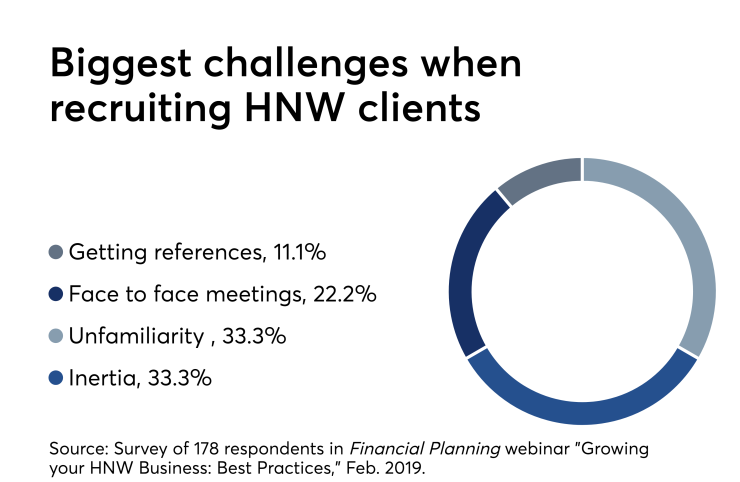At first, nobody at Cresset Capital Management was particularly eager to play a game using fuzzy toy balls from a nearby crafts store to prospect for high-net-worth clients. But, at the insistence of the firm’s leaders, the client services team hit the phones for three solid hours.
One fuzzy ball went into a jar for every call completed, three for each conversation held and five for every meeting scheduled. “Not to make a pun, but it was a ball and we had pizza and beer afterward,” says Cresset partner Doug Regan.
The game netted two new clients. The bottom line? “Make time to prospect,” Regan says.
There’s no single formula deployed by the best planning firms to attract wealthy clients, as the fuzzy ball game demonstrates. Some firms highlight unique services. Others specialize in recruiting advisors who already are working with a large roster of HNW clients.
Other firms have marquee-name founders who are locally or even nationally known as rainmakers, able to get the ear of the most challenging prospects by virtue of their reputations. No matter the approach, a little out-of-the-box thinking helps, too. It’s also important to keep in mind that advisors will have more success talking about their clients’ needs rather than about themselves, says Larry Miles, a principal at AdvicePeriod in Los Angeles.
“The best advisors should stop trying to sell that they are better than everyone else,” he says.
When talking with prospects, AdvicePeriod advisors also play down asset management services, Miles says. That’s because industrywide commoditization makes it harder for planners to add value in that area. “If they can find it on Google, they’re not going to pay for it,” he says.

Thirty to 40 years ago, clients needed assistance to find an asset allocation or investment selection, but not anymore. These days, most firms are using similar, if not the same, investment managers.
“That’s not really moving the needle for clients,” Miles adds.
Instead, AdvicePeriod focuses on philanthropy and estate planning. “When we are talking to our clients about financial and estate planning, we are talking about things that are incredibly valuable to them,” Miles says. “It’s about their families, their children, about how they want to be remembered.”
Beyond the Algorithm
The key, he says, is to provide services like these that no one has found a way to deliver via an algorithm
In fact, a 2018 study by Bank of America, “Insights on Wealth and Worth,” did find that more clients are discussing these needs with advisors. The survey shows that 48% of clients have shown interest in estate planning solutions and 15% are currently seeking guidance in strategic philanthropy.

-
The tax law overhaul has created planning opportunities.
May 7 -
When it comes to building these relationships, it’s better to start early.
April 17
Advisors can deliver real value in this area because estate planning attorneys are, at best, reactive rather than proactive, Miles maintains. After setting up a grantor retained annuity trust, for example, many attorneys aren’t likely to pay attention to how the assets inside of it have performed, nor deliver follow-up advice for clients.
“We’ve grown precisely because of the missed opportunities” like these, Miles says. The firm, with about $3.5 billion in AUM, has grown its HNW clientele to 800 from 377 in the past four months.
‘Partnership’ Culture
By contrast, Summit Trail Advisors in New York aims at attracting advisors with strong HNW books of business.
The Dynasty Financial Partners firm, with $5.5 billion in AUM — 90% of which is attributed to wealthy clients — prides itself on a so-called partnership culture in which all firm advisors have equity. This approach builds loyalty, says Jack Petersen, Summit Trail’s managing partner.
In addition, the firm does not erect obvious barriers to leaving.
“We don’t have non-solicitation [or] non-compete” agreements, Petersen says. “We don’t believe in them. If you cannot help an advisor build their business … you’re not going to likely retain them.”

Summit’s primary engine of growth, however, is its referral network, fueled by its existing client base. It also acquires practices, drums up interest through the media and works to build its brand recognition among prospects. The firm manages 15 advisors in New York City, Boston, Chicago, San Francisco and Seattle.
More Than Fun and Games
At Chicago-based Cresset, advisors don’t just rely on games to attract prospects. The firm’s structure also helps, Regan says, given that it was founded by private equity entrepreneurs Eric Becker and Avy Stein.
Frustrated by opacity, lack of transparency, conflicts of interest and difficulty contacting their previous advisors, Becker and Stein launched Cresset, which started managing money in 2017. “Most clients, when they get upset, fire the firm and they go somewhere else,” Regan says. “Private equity clients fire the firm and start their own.”
Cresset now has about $5 billion in AUM, according to the firm. Thanks to their backgrounds, the founders were able to introduce the firm to a pool of private equity investor prospects. “We rely heavily on our own internal network,” Regan says.
Once it has brought clients in the door, Cresset leverages their interests in unusual ways. For example, one client who is passionate about cars opened his garages to Cresset’s existing clients and prospects for a gathering. The firm is talking to another client, who has a presidential autograph collection, about a similar event.
“It creates an opportunity for us to have dialogues outside of commercial transactions,” Regan says, so planning is about “more than money.”
— Additional reporting by Paola Peralta
(Editor's Note: This article was originally published as





